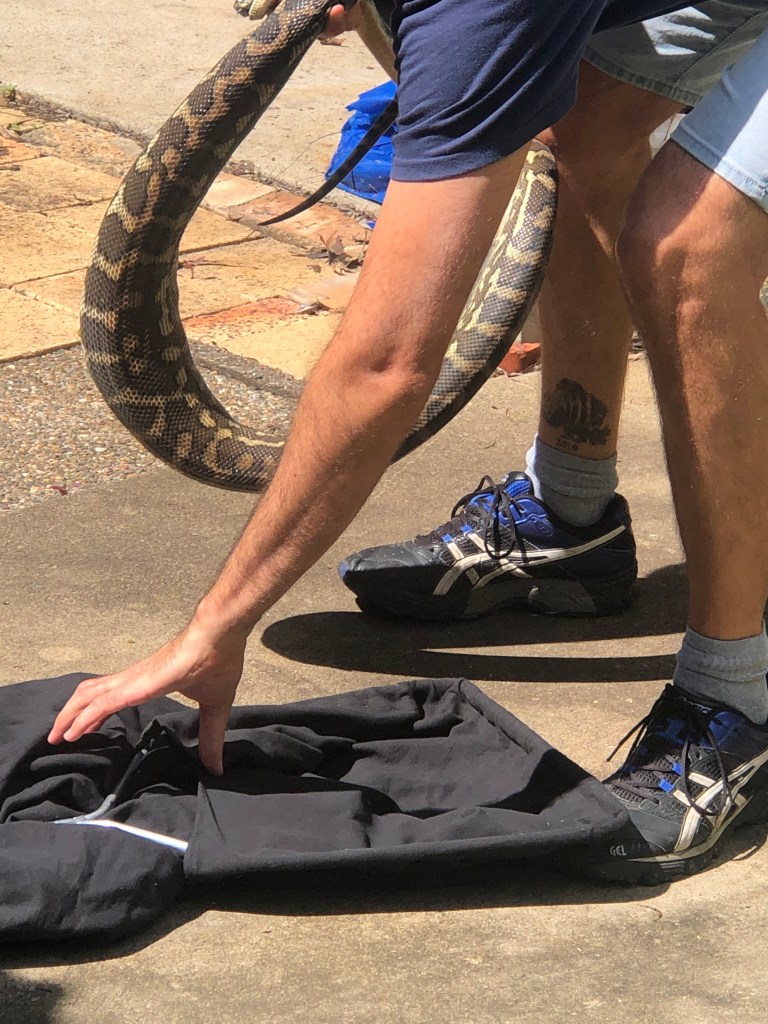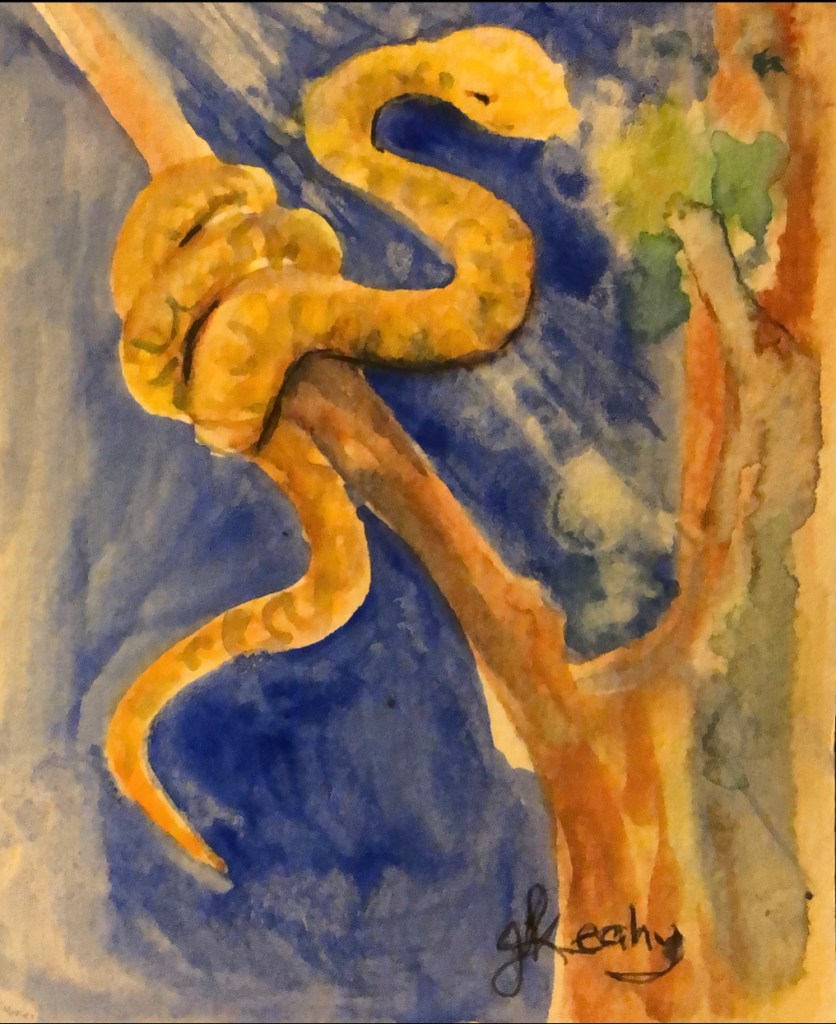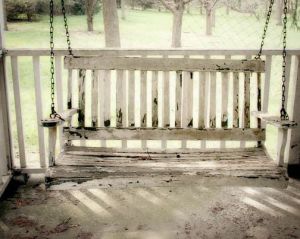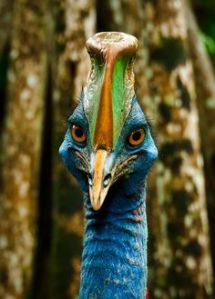J.K.Leahy Short Story

It was a regular non-event weekday until I opened my email. An email with an attachment was about to change my life. It was what I had waited for, for weeks, and yet, I could not believe it. I sat in the faded red leather chair. I had long promised myself to replace this chair when I had some money, but now, the paint had started falling off the skin to give the chair a vintage look. I had decided the aged look suited me.
When I opened the attachment, and began completing the very important document before me, something moved in the ceiling above me. It was broad daylight and the usual sounds from the ceiling would be of possums farting and snoring. Even possums kept baby-making to night time and in the nearby bushland. This loud disturbing pounding ended in sliding, scratching and then loud tumbling that got me off the red leather chair in a fright. Clearly, something big was up there. Or were there two big things? Whatever it was, its weight vibrated the ceiling. I dashed from my red chair into the open lounge. It was a “WTF?!” moment. My heart pounded to that beat in the ceiling. My house is old. She can only bear certain strains on her bones and frames.
The thing or things were now rolling and hitting the ceiling frame and came towards me. The ceiling looked like it would fall on me. I stepped backwards and looked for my phone to ring the snake catcher. By now I had assumptions going on in my head. Was it a spring mating session gone wrong? And were they possums or snakes? Or both? It was about 3pm. The sounds were not in the rhythm of life here in Bellbowrie.
As the “thing” moved again, it now became obvious it was a large snake. The sliding sound was like a tarpaulin dragged on the ground. Then, the screeching sounds of sharp nails tugging on the ceiling, timber and the iron roof.
I rang the snake catcher. No answer. I gave my assumptions in a voice message. “Snake and snake, possum and possum or snake and possum” doing something rigorous enough to break the ceiling. Later as I hung up and listened attentively, I drew the conclusion that it was a large snake attacking a possum. The possums slept in this part of the house during the day. The animal must have had a rude awakening. I felt sad and ill. I was wondered what I could do if the damned thing broke the ceiling. Catch it in a garbage bag? No!
Snakes live here in the bushland surrounds. Many. In spring, they are out hunting. We get both poisonous and non-poisonous snakes. In the past two weeks, I spotted an Eastern Brown and the Australian carpet snake or carpet python. The birds alerted me on both snakes’ locations. It was like an alarm gone off each time and nearer they got to the house. Ten days ago, I saw the 2-metre-long carpet snake outside the kitchen. For a week, it had wandered away from the house in the garden and the birds kept a close watch. On that day, it was outside the kitchen, I called Mark, our friend and local snake catcher to relocate the reptile, but he was on the coast. A few hours later, the snake was on the go. Mark describes this as “motor rolling”. When this happens, the snake moves quickly and disappears. The eastern brown was sun-bathing in a succulent garden and the birds went crazy. I sat there in the mornings to have my coffee. It disappeared when I approached. It was far from the house, so I figured it was somewhere between us and the neighbours. I informed the snake catcher and family.
When the carpet snake disappeared from behind the kitchen, it began a guessing game of where the reptile would show up next. Carpets love to hang around in the house or nearby for the rats and possums. The snake makes its appearance only rarely and quietly for water, birds or the possums. Sometimes they like to sleep in the sun where the pot plants are or in a chair. Once a female carpet curled its tail on our front door knob and it’s body spanned up two metres to the window. I had opened the door to go swimming and met her fat body while trying to push the door open. It was very hot and the snake had come for some water. Later I learnt it was very pregnant. Often a snake hung like a branch to confuse the birds; its neck hooked and head turned up and ready to strike. I’m sure you have read some of my snake stories here. I don’t harm snakes. They are part of our eco system. It is also illegal to kill them here. The relocation from this place is only because, I protect the birds and sometimes the poisonous snakes become too difficult to see when you move about. I do believe many relocated species have come back.
The Australian carpet snake.
Collection and relocation of a sunbather.

The ceiling noise kept going and drew me back. I shut all the room doors. The afternoon’s excitement got to the stage where the ceiling joint gaped slightly and dirt and dried paint fell out. By now, Mark had called back and he was very sorry he could not help because I told him, the snake was not out where he could see and pick it up. He said to keep a watch and call later in the evening if the snake was out. Mark had caught and relocated one while it constricted a large male possum one night. The snake lashed out and trapped the possum with its body above my children and I, while we were having dinner. The attack shocked us at dinner table. I had argued with my son Nathan as to what was happening in the ceiling until the possum’s cries horrified us. We called Mark. By the time Mark took it out from the ceiling, the possum had died. This one was further into the ceiling. I could not see it from the outside and it was dangerous to intercept a feeding time.
While I kept watch with the broom in my hand, thinking I should finish my document on the computer, I remembered the arrival noise in the ceiling nights before. I realised today’s craziness was the ending of the snake stake out. Even though the snake had fallen onto the roof days before, it did not attack the possums right away. The possums did come on the roof the same way, using the jacaranda trees and when sensing the snake, they ran across the roof like elephants and jumped off onto the trees. It was a movie of sounds.
So, a few nights ago, about midnight, a rustle of jacaranda leaves, a large branch bending, a huge thud was followed by a continuous sliding over my bedroom. The ‘motor rolling’ confirmed the reptile had now made its way into our ceiling, a regular hunting ground and home to a family of possums. The reptiles catch the possums easier this way – trapped in the ceiling. And the possum numbers sadly have dropped since we moved here ten years ago. I tried to chase the snake again.
With the house broom, I started pounded the ceiling and yelled in my loudest Papua New Guinean woman voice. It was a voice I learnt as a child that was only used when you needed to save yourself. (It was a scary voice. My mother also used this voice as a last call, when she was very angry). I yelled and scraped the ceiling with the back of the broom head. The broom sound mimicked the motor rolling sounds. Suddenly in all the mixed and confusing noises, I heard an eerie sound. It was nothing like the thumping sounds. It sounded familiar and as I repeated the scraping, the sound responded. I could not believe it. The snake was hissing loudly. I was astounded. I used the broom again and the snake got loud, and aggressive. I yelled at the snake to leave the house. But the noise continued. Mark suddenly called. Mark could tell by my voice; I was in distress. I said to him, I would leave for a while and he thought it was a great idea. He said by nightfall, the reptile will disappear. After I hung up, I left the house.
It was quiet when I returned two hours later. It was getting dark. I switched the lights on in all the rooms, thinking the heat could warm the ceiling and alert my ‘hissing encounter’ that I was back. I had also hoped this heat would force it to motor roller away. I picked up the broom and scraped the ceiling once more and was greeted with a soft hissing. It was possible the reptile was guarding its fresh kill. I heard the gentle movements. The waiting.
“Yu win pinis!” I spoke firmly to the ceiling. In Tok Pisin, it meant, you have won already. I put the broom away and continued with my business. I had no time to wait. I completed my document and clicked “send”. I carried on as if it was a regular non-event evening. After I took my shower, I slept with my eyes wide open, hoping to hear the motor rolling – going away from me.
The next day, I woke at 7am and made a cup of tea. The birds were singing. The ceiling was intact. It was calm in the house. Where the previous day’s debris had escaped from the ceiling gap and piled on the timber floor, I reached up with the broom and scraped the ceiling. Nothing happened. I did another scrape with the broom head and there was not a single sound, nor hissing.
If you enjoyed this story, you can search for other snake stories on this blog. Feel free to comment, like and share the post. Thank you.













